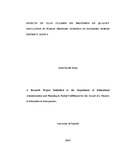| dc.description.abstract | According to the UNESCO Global Monitoring Report 2011, violent conflict is one of the greatest development challenges facing the international community (UNESCO, 2011). Beyond the immediate human suffering it causes, it is a source of poverty, inequality and economic stagnation. Children and education systems are often on the front line of violent conflict. The 2011 Global Monitoring Report examines the damaging consequences of conflict for the Education for All goals. It sets out an agenda for protecting the right to education during conflict, strengthening provision for children, youth and adults affected by conflict, and rebuilding education systems in countries emerging from conflict. Drawing on experience from a range of countries, it identifies problems and sets out solutions that can help make education a force for peace, social cohesion and human dignity. On Average, armed conflict is robbing 28 million children of an education by exposing them to widespread sexual violence, targeted attacks on schools and other abuses. The Report released on March 1, calls for tougher action against human rights violations, an overhaul of global aid priorities and more attention to education’s potential to foster peace. Education accounts for just 2% of humanitarian aid.
The purpose of this study is to investigate the effects of clan clashes on provision of quality education in public primary schools in Mandera North District, Kenya.
This study sought to establish the effects of displacement of families during conflict on the provision of quality education in public primary schools in Mandera North District; to establish the effects of loss of parents or guardians on the provision of quality education in public primary schools of Mandera North District; to determine how the destruction of infrastructures in the area during conflict affects the provision of quality education in public primary schools in Mandera North District and to examine the effects of deprivation of source of livelihood on provision of quality education in public primary schools in Mandera North District.
The study adopted a descriptive survey research design since the study aimed at capturing respondents’ opinions, attitudes, beliefs and knowledge based on the impact of perennial clan clashes on schools in Mandera North District. The sample population for this study comprised of 28 head teachers, 144 teachers, 150 parents and 2,503 pupils in primary schools in Mandera North District were randomly selected to participate in the study comprising 30 per cent and given questionnaires to fill. Questionnaires were used for this study because they are much more efficient in that they permit collection of data from a much larger sample.
The questions were both close ended and open ended to elicit certain responses which were sought and to add more information that were of importance to the study. Focus group discussions were used with both students and parents to elicit
information on the effects of clan clashes on provision of quality education. Analysis of data started with editing to identify errors made by the respondents such as spelling and any un-responded to items. Quantitative data derived from the demographic section and the closed questions were analyzed using descriptive statistics using percentages and frequencies to enable meaningful description of the distribution. The findings of the study were that the inter-clan clashes led to loss of parents and guardians, destruction of infrastructure, loss of source of livelihood when livestock is killed or stolen, displacement of populations, including school children, all which affect the quality of education received by children of Mandera north District, Mandera County. The study concluded that inter-clan clashes are a major contributor of displacement of families from their homes, the loss of parents or guardians, lack of adequate infrastructure, and/ deprivation of source of livelihood. The study recommends facilitation of inter-ethnic dialogue between traditional elders, youth and women, help by both the national and county governments to construct infrastructure destroyed during clashes, introduction of peace education, government sponsoring feeding programmes in schools to encourage enrollment and retention, and the introduction of education in emergencies in teachers training colleges to equip teachers with knowledge, skills and attitudes to be able to deal with children in such situations. The study suggests that a replica of the study should be carried out in the neighbouring districts, the same study be carried out in other districts with different social challenges for comparative purposes, a study should be done on the role of youth in fuelling rebellion and finally, a study on the importance of peace education in stemming militant behaviour among the youth. | en |

